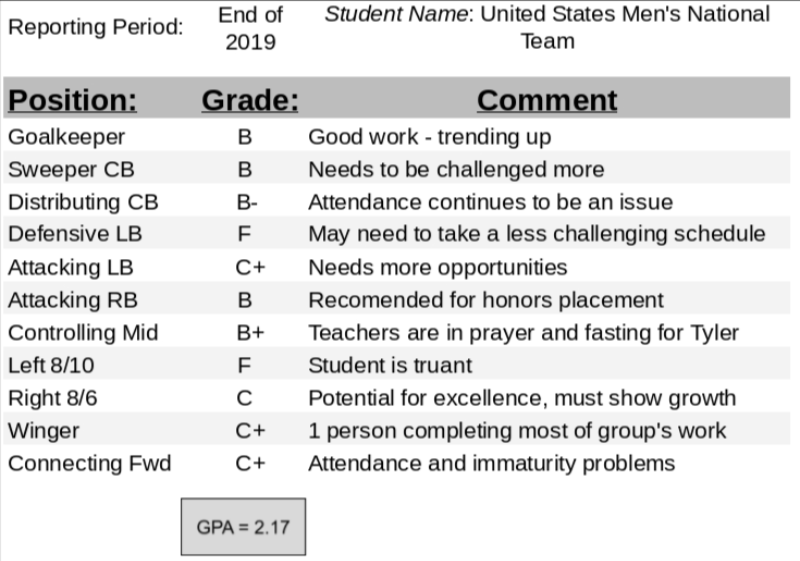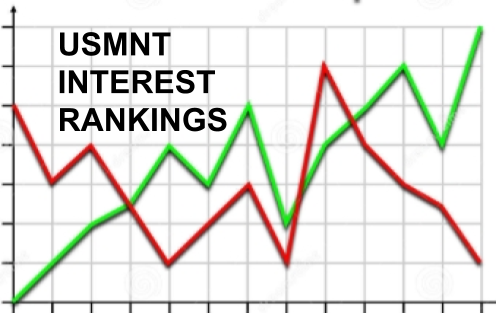America is a nation with many flaws, but hopes so vast that only the cowardly would refuse to acknowledge them.
~James Michener
TLDR Summary: Being American has recently flipped from a negative to a positive due to soccer’s rosy outlook in the US and the increase in quality/quantity of young prospects. Ze Germans figured it out early.
For years now we have heard and read about the stigma attached to American soccer players in Europe. How American players have to prove themselves to a manager where a French player, for instance, wouldn’t. Take this quote from Hercules Gomez for example, “But as many American guys who have tried, there has only been one Clint Dempsey in recent years. Americans are respected but they are seen as hardworking bargains. Not a lot of teams will break the piggy bank on an American.”
Or this one from Jerome de Bontin, former NYRB general manager, “Any president who brought one in would face a fight with a coach who won’t give an American the time of day, not because he is lacking skill-wise or physically, but because U.S. players are not taken seriously.”
One more, this one from Michael Bradley, “But the reality is at the moment there is still a little bit of a feeling that if you can have an American or an Argentine, you’re taking the Argentine. Some people can look at that as feeling sorry for yourself, but that’s the reality.”
Being American is Now a Positive
But now, in the last couple of years, there has been a shift. This quote is from Michael Schade, former CEO of Bayer Leverkusen, “If a player from the United States would come here and score every week, it would be a dream come true.”
It seems that, almost overnight, being American has morphed from a handicap to a selling point. It’s to the point that transfers/transfer rumors for American players are being criticized because of this. “They just want him because he’s American…” was splattered all over Twitter during the Pulisic transfer saga.
This analysis of the Pulisic transfer includes this bit of evaluation, “Being the crown in the jewel of the American market, Pulisic brings great marketing power to West London.” American players are now seen, at the very least, as potential financial assets. Watch what happens this summer when the Weston McKennie to Liverpool transfer rumors (or wherever) start cropping up in earnest.
Why?
European teams, and specifically Germany, have caught wind of something…
Men in Blazers have a running gag that soccer has been the “sport of the future” in the US since 1973 or something. They’re not wrong, but when you look at the demographics of soccer fans, things are clearly changing.

The average age of an NFL fan is 50, MLB – 57, and soccer…just 40. That means there’s a lot of young people watching soccer. Young people = $$$ and everyone wants that. The US is the largest economy in the world. If that economy is starting to fall in love with soccer…things gonna change.
German Planning
My father-in-law is German. He also has enough wood cut and stacked in his backyard to heat his house for the next 2-3 years at all times. Why include this piece of random information? As a culture, Germans plan ahead.
I can’t quite wrap my head around Hoffenheim coach Julian Nagelsmann signing for RB Leipzig a year ahead of time. (Hoffenheim fans are really cool with that?) However, it’s accepted and doesn’t bother people in Germany. You can’t even quit your job there or just give two weeks notice. There is a law in Germany requiring employees to give four weeks notice when they resign. Company has to have time to plan…
What’s the point? Well, where are the majority of young American prospects ending up? They are going to a league where they have clearly identified a source of (cheap) future talent and income. With Pulisic, McKennie, Adams, and whoever breaks through next, Germany has a 3-5 year head start on all the other leagues in Europe. RB Leipzig got Adams for $3 million(!) because the Austrian-based company has planned masterfully. How much is he going to be worth this time next year? Hint – MORE.
These players are the metaphorical dead canaries the Germans noticed before the other European leagues. German clubs have taken advantage of the first wave of American talent that grew up in the development academy and gotten it at bargain basement prices.
The Yedlin training compensation case is due to be settled any day now (I feel like I’ve also been hearing this since 1973). If it turns out that the US is going to join the rest of the world in that system, then Germany will also have raided the American talent market before they even had to pay those fees.
*Additional Note*
It’s also much easier for Americans to move to Germany. The labor laws there are more lenient and that allows Americans to work/play there more easily. Many other countries (France, England, etc.) have laws or league rules that make it much more difficult for American players to move to those leagues.
Now what?
Germany was the first, but other leagues will surely follow. Why does Liverpool keep getting linked with American players? I love Weston McKennie, but there have to be other 20-year old midfielders that would fit the bill for the Merseyside club. If there are enough good American players being produced, they aren’t going to be a bargain for much longer. There might even be a premium paid.
The US is now churning out prospects. Youth soccer is a numbers game. Germany, Spain, France, Brazil, etc. have so many high level prospects that when Pato flames out it’s no big deal. When Freddy Adu didn’t turn out to be what we thought he was going to be, there was nobody else.
Right now, off the top of my head – Mendez, Ledezma, Carleton, Busio, Reyna, Pomykal, and maybe even Efra (*crosses fingers*) are all #10 prospects coming up. Some of them are going to bust, but if 1 or 2 hit…it’s exciting to daydream.
I started seriously following soccer around 2005. Since then I have been excited about Charles Renken, Joe Gyau, Bobby Convey, Luis Gil, and a whole host of other prospects that didn’t pan out for one reason or another. For the first time, I think the US has the apparatus in place (the DA, 2 divisions of USL, MLS team academies, players moving to Europe) to get these kids playing time from 16-20 and pump out talent like a real soccer playing nation.
The next couple of years are going to be mighty interesting. I know Taylor Twellman’s, “…there will be 20 Christian Pulisics in Europe by the end of 2020.” (around the 23 minute mark if you want to listen) is probably a bit of hyperbole, but maybe not by much.




It really does feel like we’ve turned a corner. The young generation has a lot of confidence….its nice to feel something good about America. Been struggling with that lately 🙂
I’m an optimist but I think/hope so.